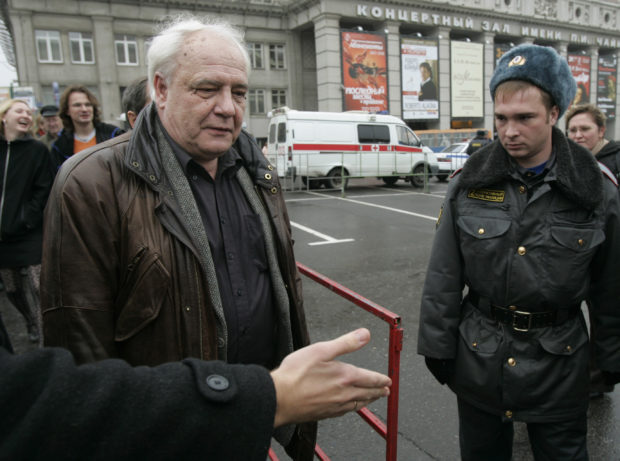Prominent Soviet dissident Bukovsky dies at 76

In this Saturday, October 20, 2007 file photo, Soviet-era dissident Vladimir Bukovsky, left, arrives for a meeting with his supporters in Moscow, Russia. Vladimir Bukovsky, a prominent Soviet-era dissident who became internationally known for exposing Soviet abuse of psychiatry, died on Sunday, October 27, 2019. He was 76. (AP Photo/Ivan Sekretarev, File)
MOSCOW — Vladimir Bukovsky, a prominent Soviet-era dissident who became internationally known for exposing Soviet abuse of psychiatry, has died. He was 76.
Bukovsky died of cardiac arrest on Sunday after a period of ill-health in Cambridge, England, where he had settled after being deported from the Soviet Union in 1976, according to the Bukovsky Center volunteer organization.
Bukovsky spent a total of 12 years in Soviet prisons or psychiatric hospitals for his fierce criticism of the Communist government, becoming a symbol of Soviet persecution of dissent.
In 1961, he was expelled from Moscow State University, where he studied biology, for writing a thesis critical of the Komsomol, the Soviet Union’s communist youth organization.
Bukovsky was first arrested in 1963 for possession of books banned in the Soviet Union, declared mentally ill and sent for treatment to a psychiatric hospital where he spent almost two years – the first of several stints in Soviet psychiatric institutions. He was arrested again and handed a prison term in 1967 for a street protest.
Article continues after this advertisementIn 1971, Bukovsky smuggled out materials documenting the Soviet use of psychiatry for punishing dissenters. Their publication drew international outrage, and he was quickly arrested. The following year, he was sentenced to seven years in prison and labor camp to be followed by another five years of internal exile.
Article continues after this advertisementBukovsky’s fate attracted global attention and in December 1976 the Soviet authorities agreed to trade him for imprisoned Chilean Communist Party leader Luis Corvalan.
His book of memoirs, “To Build a Castle,” has been widely published. After the 1991 Soviet collapse, he authored “Judgment in Moscow,” a book that called for a trial of Soviet Communist Party and KGB officials similar to that of Nazi leaders’ trials in Nuremberg.
Bukovsky maintained regular contacts with Russia’s opposition leaders and frequently visited his homeland after the Soviet collapse. He became a fierce critic of President Vladimir Putin’s rule and aspired to run for president in Russia’s 2008 election, but election officials rejected his bid, citing procedural reasons.
In 2015, British prosecutors opened a case against Bukovsky over indecent images of children allegedly found on his computer. Bukovsky rejected the accusations and sued prosecutors for libel. His trial was repeatedly adjourned and in 2018 a judge ruled that Bukovsky’s health was too poor for him to testify. /kga